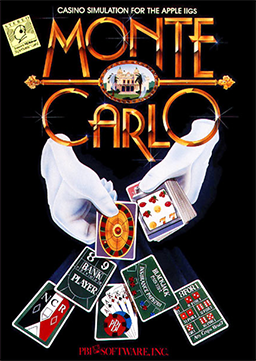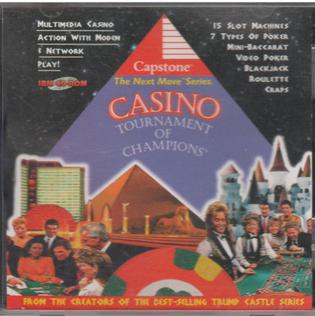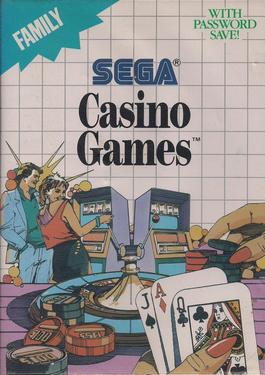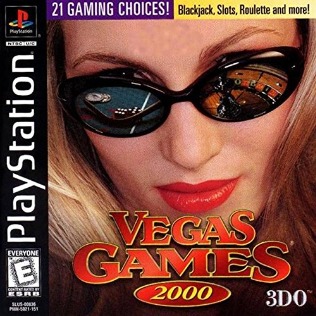
Games available in most casinos are commonly called casino games. In a casino game, the players gamble cash or casino chips on various possible random outcomes or combinations of outcomes. Casino games are also available in online casinos, where permitted by law. Casino games can also be played outside casino for entertainment purposes like in parties or in school competitions, some on machines that simulate gambling.
Online casinos, also known as virtual casinos or Internet casinos, are online versions of traditional casinos. Online casinos enable gamblers to play and wager on casino games through the Internet. It is a prolific form of online gambling.
Breaking Vegas is a television series that premiered on The History Channel in the United States in 2004. The series covers the great lengths people have gone to make money, sometimes illegally, from casinos.

Hoyle Casino is a virtual casino video game series, developed and published originally by Sierra Entertainment and since 2005 by Encore, Inc. It is a spin-off of Sierra's Hoyle's Official Book of Games series. Set in a virtual Las Vegas casino, players create profiles and are given a set amount of virtual money. A player can then visit any part of the virtual casino and wager their virtual money as they could in a real casino. Hoyle Casino Empire is different from other games in the series as it is a business simulation game.

A cardroom or card room is a gaming establishment that exclusively offers card games for play by the public. The term poker room is used to describe a dedicated room in casinos that is dedicated to playing poker and in function is similar to a card room.

Golden Nugget 64 is a multiplayer virtual casino video game for the Nintendo 64. It was developed by Westwood Pacific, published by Electronic Arts, and was released on December 1, 1998 in North America. Golden Nugget 64 is unique because it is the only gambling/casino game released in North America for the Nintendo 64. The game starts off by having the player create an account with $1000 which is saved on the controller pack. Players have the choice from one of ten different popular casino games. Each game has its own set of rules and a guide to learn how to play.
Jerry L. Patterson is an American writer. He authored several gambling books as well as a gambling newspaper column.

Monte Carlo is a gambling simulation video game created for the Apple IIGS, created by PBI Software. It was programmed by Richard L. Seaborne and released in 1987.
Advantage gambling, or advantage play, refers to legal methods used to gain an advantage while gambling, in contrast to cheating. The term usually refers to house-banked casino games, but can also refer to games played against other players, such as poker. Someone who practises advantage gambling is often referred to as an advantage player, or AP. Unlike cheating, which is by definition illegal, advantage play exploits innate characteristics of a particular game to give the player an advantage relative to the house or other players. While not illegal, advantage play is often discouraged and some advantage players may be banned by certain casinos.

Bicycle Casino is a gambling game for the Xbox created by American developer Leaping Lizard Software and published by Activision Value on October 26, 2004. Described by the developer as a simulation of an "authentic casino environment", the game is a compilation of casino games licensed by Bicycle Playing Cards, with an advertised 500 variations on games including texas hold'em and blackjack. The game was marketed as the first casino title released for the Xbox to have featured multiplayer capabilities using Xbox Live. The game was released to generally mixed reviews, with publications praising the inclusion of online play, but critiquing the game's presentation and performance of AI players.

Caesars Palace 2000 is a gambling simulation video game developed by Runecraft and published by Interplay Entertainment. It was released in North America and Europe in June 2000 for the PlayStation, Dreamcast and Microsoft Windows' PCs. It is named after the famous Caesars Palace luxury hotel and casino on the Las Vegas Strip in Las Vegas, Nevada.

Lynx Casino is a 1992 gambling simulator for the Atari Lynx developed by Brian A. Rice Inc. It includes blackjack, craps, roulette, slot machines, and video poker.

Casino Tournament of Champions is a video game developed by Random Programming and published by Capstone for MS-DOS.

Hard Rock Casino is the title of several gambling video games released between 2003 and 2007, and based on the Hard Rock Cafe brand. The first Hard Rock Casino game, developed by MumboJumbo and published by Jamdat Mobile for Microsoft Windows, was released in the United States in 2003. The game was subsequently published by MacPlay for Macintosh in the United States, in January 2004. Later in 2004, Jamdat Mobile developed and published a version for mobile phones in the United States.

Casino Deluxe is a video game developed and published by Impressions for the Microsoft Windows.

Golden Nugget is a 1996 gambling simulation video game video game developed by Abalone Entertainment and Software Development, and published by Virgin Interactive Entertainment for Microsoft Windows. A PlayStation version, developed by Point of View, Inc., was also published by Virgin Interactive in 1997. Golden Nugget is set at the Golden Nugget hotel-casino in Las Vegas. It features 16 gambling games, and a story mode that includes a character portrayed by actor Adam West.

Casino Games is a video game compilation developed by Compile, published by Sega and released in 1989 for the Master System. The game is a compilation of five games in one cartridge, mainly gambling games.

Vegas Games 2000, known as Vegas Games: Midnight Madness, Midnight in Vegas in Europe and Vegas Games on Game Boy Color, is a gambling simulation video game. It was released on Microsoft Windows in 1998, then released in 2000 on PlayStation and Game Boy Color. New World Computing, who developed the original PC version, had previously developed Vegas Games and More Vegas Games for Windows in the early 1990s.

Trump Castle II is a 1991 video game published by Capstone Software.

King of Casino is a 1990 gambling simulation video game developed by Algorithm Institute, published in Japan by Victor Musical Industries and in North America by NEC for the TurboGrafx-16. The game sees the players go to different casinos with $10000, using the money to participate in poker, blackjack, roulette, slot machines and keno, in order to win $10 million. It received generally favourable reception from critics, most of which reviewed it as an import title.
















